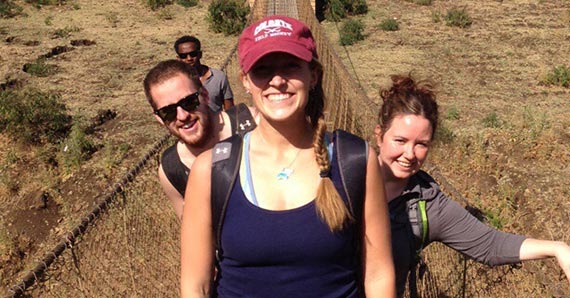
Kelsey Jensen ’14 (center), with Josh Hair ’14 and Professor Carrie Woods, traveled to Ethiopia during winter break.
(Editor’s Note: This post is by Kelsey Jensen ’14, a major from Williston, Vt. See more photos and read about her daily experiences in Ethiopia at her personal .)
During winter break I discovered that working on an interdisciplinary research project in a foreign country is one of the most interesting ways to learn about a new culture.
Research that combines natural science, social science, and humanities is rare to find, but ¸Ô±ľĘÓƵ is a university where collaborations like this happen, and I was lucky enough to get involved. Using the Alumni Memorial Scholarship granted to me upon admission, I spent three weeks of my winter break in Ethiopia working with Professors and from the , and from the , and from the , studying the Ethiopian Orthodox Church Forests.
Along with two other students, Josh Hair ’14, a major from West Henrietta, N.Y., and Mabel Baez ’15, a major from Springfield, Mass., I helped collect samples and data about these forests that will inform us about their current ecological status and future sustainability. As Ethiopia is almost entirely deforested, these forests are islands of biological diversity in an otherwise agricultural landscape.
While we spent roughly nine hours a day in the field, and another one or two processing samples and entering data every night, I did manage to find some time to keep a blog of every day we were in Ethiopia. It is an incredible country with a beautiful landscape and amazingly friendly people.
MORE
The research project Kelsey took part in was funded by the university’s . The institute funds several each year.
We learned a lot about ecology in the field but we were also learning about the concepts of stewardship in the Ethiopian church, how the people are utilizing this resource and how they understand conservation practices.
Almost every day we spent time with school children who would run up to our cars, excited just to watch the Americans with their funny accents and unusual field gear. We attended an Ethiopian Christmas Mass and were treated to a Christmas meal at a local collaborator’s house, and experienced the incredible two-day, countrywide celebration of the Epiphany. We even had a little spare time to take a boat ride on Lake Tana and visit the Blue Nile water falls!
Despite thorny plants and aggravating biting ants, we were able to fully analyze 14 forests, collecting samples to bring back to ¸Ô±ľĘÓƵ’s labs, and establishing long-term research plots so that this project can continue to track changes of the forests. I could not have asked for a more rewarding research experience and am glad I was able to put time into documenting our adventures!
